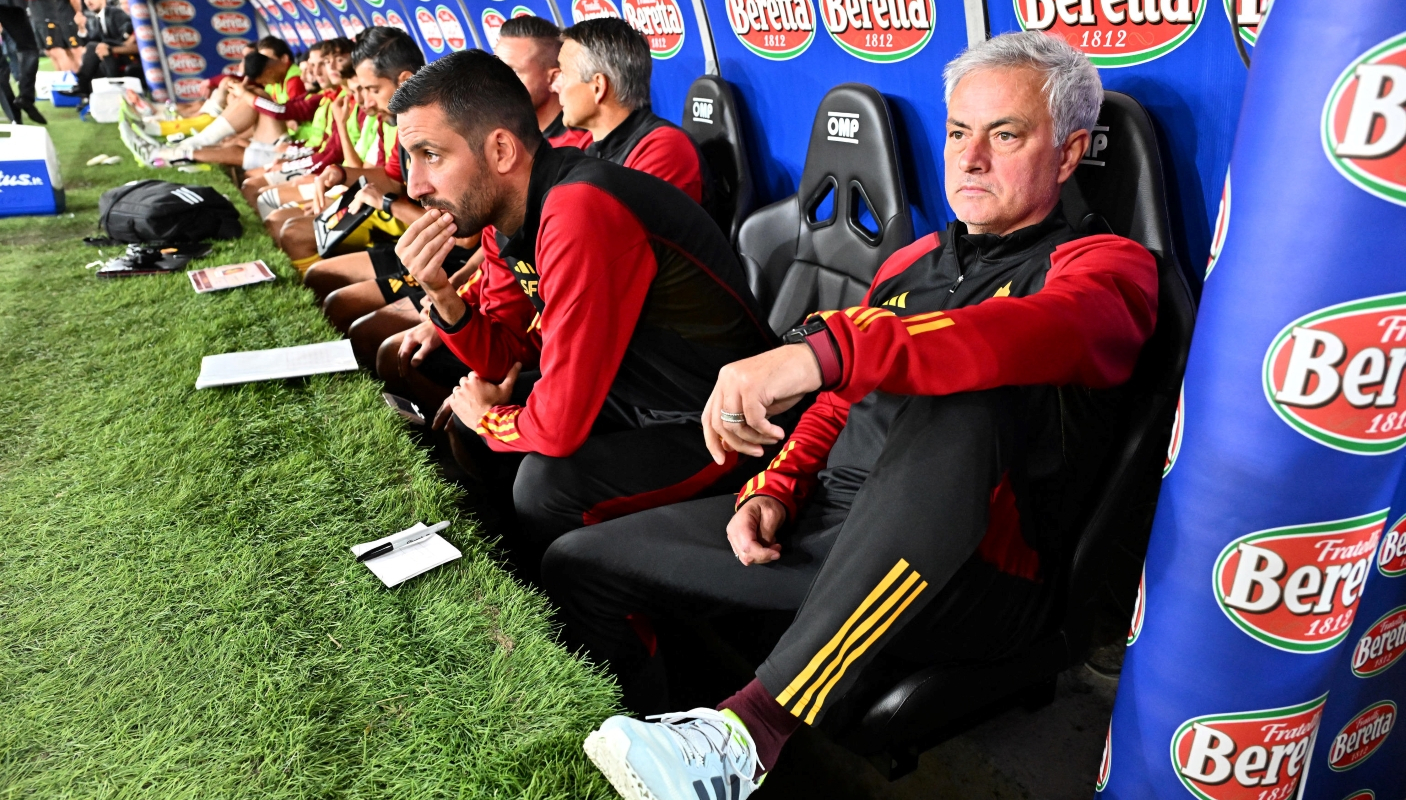Jose Mourinho has become the source of much criticism after Roma’s miserable start to the new season, but the Portuguese coach does not deserve all of the blame, Apollo Heyes argues.
The Giallorossi have suffered their worst start to a season in recent memory, managing to pick up just five points from their opening six matches, leaving them 16th in the Serie A table.
Roma’s only domestic win this season came in their 7-0 thrashing of Empoli, but things have been dire otherwise – draws with Salernitana and Torino, and losses to Hellas Verona, Milan and Genoa.
With it being Mourinho’s third season in the dugout in the Italian capital, it’s incredibly easy to suggest that this is another example of how things go wrong for him after two years. That is a lazy examination of the situation, with far greater problems hampering the team.
The first of these, and one that has been most widely acknowledged, is the club’s injury crisis; five first team regulars are currently out on the sidelines and will not take part in their next game against Frosinone – Marash Kumbulla, Diego Llorente, Chris Smalling, Tammy Abraham and Renato Sanches.
Considering that the season is not even two months old, this is an incredibly uncomfortable position for Mourinho and Roma, severely limiting their flexibility and options across the pitch. As a result, certain players will have to feature more heavily, increasing their chances of suffering their own physical issues.
The second factor hamstringing the Giallorossi is their lack of investments. Financial restrictions imposed by their Financial Fair Play settlement with UEFA were apparent in the summer, and despite their efforts it’s clear that they were unable to bring in the same level of reinforcements as their rivals at the top of the table.
Roma only signed one player on a definitive transfer this summer – Leandro Paredes from Paris Saint-Germain for €2.5m. Other players arrived on loan like Romelu Lukaku and Renato Sanches, or on free transfers like Evan Ndicka and Houssem Aouar. In total, the club spent just €9.3m between loan fees and the Paredes deal.
In comparison, Napoli spent €66m on new players, Lazio around €30m, Inter over €50m, Milan over €100m, Atalanta over €60m and Juventus over €20m. Looking at the gap, then, it’s not hard to see why the Giallorossi are struggling to keep up with the other top teams.
The third factor is the frankly unforgiveable work of goalkeeper Rui Patricio, who continues to stand out as the worst amongst his peers in the Italian topflight. The underlying numbers perfectly signpost how the 35-year-old Portuguese goalkeeper is holding his team back.

Rui Patricio has conceded 11 goals from 19 shots on target faced in the opening six Serie A matches, making just eight saves in that time. When looking at his post-shot expected goals minus goals allowed (PSxG-GA), his underperformances really stand out.
PSxG-GA shows the quality of a goalkeeper’s shot stopping abilities, based on the quality of shots faced. A positive number like +2 suggests that a keeper has stopped two more goals than they should have, and a negative shows the opposite, that the keeper has conceded two more than they should have.
Rui Patricio has a PSxG-GA of -4.0, the worst out of all goalkeepers in Serie A this season. This highlights how the 35-year-old should’ve stopped four of the 11 goals he conceded, something that undoubtedly caused the team to drop points already this season.
This isn’t a new fact. Last season, the Portuguese veteran posted a PSxG-GA of -6.4, the second worst in the league behind Sassuolo’s Andrea Consigli (who had an almost unbelieved -14.5 PSxG-GA). The graph above shows Rui Patricio’s percentile rank compared to his peers in Europe’s top five leagues, visualising his poor work.
Mourinho cannot be blamed for this. The club did not sign a goalkeeper in the summer and the reinforcement that arrived last year, Mile Svilar, has not looked any more convincing. The other underlying numbers, like Roma’s combined xG and average shots on target per 90 minutes, stack up to their rivals, suggesting some level of misfortune.
Considering all of the above then, is it truly fair to entirely blame Mourinho for Roma’s poor start?
The Portuguese coach guided the club to a Europa Conference League title in his first season and took them to the Europa League final in his second, doing incredibly well considering the resources available to him. So, despite his history of trouble in his third years at clubs, maybe it’s fair to give Mourinho the benefit of the doubt until the league table starts to settle more.
Words: @ApolloHeyes


Bit of a weak argument. Kumballa and Sanches are hardly regulars. Also, Mourinho’s first season they had a net spend of +110 mil…
David De Gea is still available for free. Rumours have it that he’s going to retire if there’s no offer from a top club. If he’s not too adamant on getting exorbitant salary and Roma could pull another Dybala-esque kind of salary offer, I don’t know, might be worth a try, could be good for both parties.
Why viewers still use to read news papers when in this technological globe everything is
available on net?